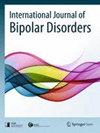Perceived loneliness and social support in bipolar disorder: relation to suicidal ideation and attempts
IF 3.5
2区 医学
Q2 PSYCHIATRY
引用次数: 0
Abstract
The suicide rate in bipolar disorder (BD) is among the highest across all psychiatric disorders. Identifying modifiable variables that relate to suicidal thoughts and behaviors (STBs) in BD may inform prevention strategies. Social connectedness is a modifiable variable found to relate to STBs in the general population, but differences exist across subgroups of the general population and findings specifically in BD have been equivocal. We aimed to clarify how perceived social connectedness relates to STBs in BD. 146 adults (86 BD, 60 healthy controls) completed clinical interviews (Hamilton Depression Rating Scale; Structured Clinical Interview for DSM-5) and self-report measures of loneliness (UCLA Loneliness Scale) and social support (Interpersonal Support Evaluation List). Analyses explored differences in indicators of social connectedness (loneliness and social support) between BD participants and healthy controls, and explored relationships between STBs (lifetime suicide attempts and current suicidal ideation) and indicators of social connectedness in BD participants. BD participants reported significantly higher loneliness and lower social support than healthy controls. In BD participants, perceived social support was significantly related to both ever having attempted suicide and number of lifetime attempts. Interestingly, perceived loneliness, but not social support, was significantly associated with current suicidal ideation. Findings expand the evidence base supporting a relationship between perceived social connectedness and STBs in BD. They suggest that this modifiable variable could be a fruitful treatment target for preventing STBs in BD.双相情感障碍患者的孤独感和社会支持:与自杀意念和企图自杀的关系
双相情感障碍(BD)患者的自杀率是所有精神疾病中最高的。找出与躁狂症患者自杀想法和行为(STBs)相关的可改变变量,可以为预防策略提供参考。在普通人群中,社会关联性是与 STBs 相关的一个可调节变量,但在普通人群的不同亚群中存在差异,而专门针对 BD 的研究结果也不明确。我们的目的是澄清感知到的社会关联性与 BD STBs 的关系。146 名成年人(86 名 BD 患者,60 名健康对照者)完成了临床访谈(汉密尔顿抑郁评分量表;DSM-5 结构化临床访谈)以及孤独感(UCLA 孤独感量表)和社会支持(人际支持评估表)的自我报告测量。分析探讨了 BD 参与者与健康对照组之间社会联系指标(孤独感和社会支持)的差异,并探讨了 STB(终生自杀未遂和当前自杀意念)与 BD 参与者社会联系指标之间的关系。与健康对照组相比,BD 参与者报告的孤独感和社会支持明显较高。在 BD 参与者中,感知到的社会支持与曾经自杀未遂和终生自杀未遂的次数都有显著关系。有趣的是,感知到的孤独感(而非社会支持)与当前的自杀意念显著相关。研究结果扩大了支持感知到的社会联系与 BD STB 之间关系的证据基础。这些研究表明,这一可改变的变量可能是预防 BD STBs 的有效治疗目标。
本文章由计算机程序翻译,如有差异,请以英文原文为准。
求助全文
约1分钟内获得全文
求助全文
来源期刊

International Journal of Bipolar Disorders
Medicine-Psychiatry and Mental Health
CiteScore
6.70
自引率
5.00%
发文量
26
审稿时长
13 weeks
期刊介绍:
The International Journal of Bipolar Disorders is a peer-reviewed, open access online journal published under the SpringerOpen brand. It publishes contributions from the broad range of clinical, psychological and biological research in bipolar disorders. It is the official journal of the ECNP-ENBREC (European Network of Bipolar Research Expert Centres ) Bipolar Disorders Network, the International Group for the study of Lithium Treated Patients (IGSLi) and the Deutsche Gesellschaft für Bipolare Störungen (DGBS) and invites clinicians and researchers from around the globe to submit original research papers, short research communications, reviews, guidelines, case reports and letters to the editor that help to enhance understanding of bipolar disorders.
 求助内容:
求助内容: 应助结果提醒方式:
应助结果提醒方式:


